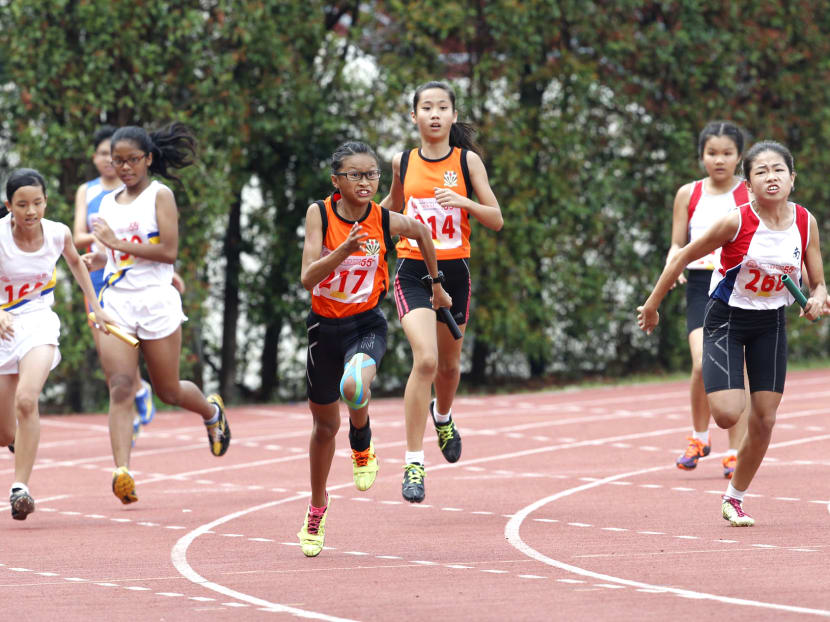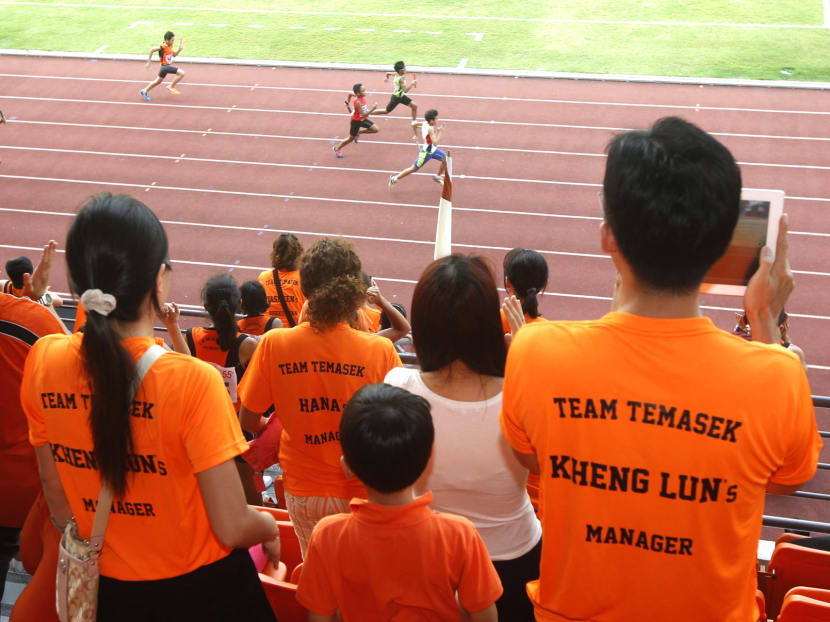‘Sports tuition’ a growth field
SINGAPORE — When Tiffany Yau took over the baton for the anchor leg of the 4x300m relay finals at the National Primary Schools Track and Field Championships last month, the pressure rested squarely on the 12-year-old’s young shoulders to be first across the line.


SINGAPORE — When Tiffany Yau took over the baton for the anchor leg of the 4x300m relay finals at the National Primary Schools Track and Field Championships last month, the pressure rested squarely on the 12-year-old’s young shoulders to be first across the line.
With the grit of a seasoned athlete, the Primary Six student from Temasek Primary School sprinted home to the deafening cheers from hundreds of supporters, including her parents.
For Tiffany, and many others like her, the competition to excel in sports is important as it has a bearing on where they will end up in the next academic year.
In the stands, talent scouts from various secondary schools were keeping close tabs, and even before the finals, Tiffany and her parents had already been approached by spotters from Cedar Girls’ Secondary School and the Singapore Sports School with provisional offers to join the schools under the Direct School Admissions (DSA) programme.
Introduced in 2004, the DSA scheme provides an alternative avenue for P6 students to gain admission into secondary schools. Under this scheme, participating schools have flexibility to admit students on the basis of their sporting abilities. As a result, an increasing number of primary school students are taking up private coaching in the bid to be better in their sport.
“All parents want their kids to do well, and go into good secondary schools. We are no different,” said Tiffany’s mother Josephine Yau.
“Top schools in Singapore want all-round students. Academics alone may not be enough these days. (Private coaching) is like tuition, but in sports, to boost a kid’s chances to be better than his peers and gain admission into a top school.”
Tiffany trains up to five times a week for up to two hours each time, supplemented by twice weekly private sports coaching. The result was two gold medals (200m, 4x300m) and a bronze (4x100m) at the nationals, which puts her in good stead for the DSA. “I also have tuition classes around four times a week, but I just have to manage my time well,” the budding sprinter said. “It feels very hectic sometimes, but I see it as a challenge.”
Schools administrators and sports coaches TODAY spoke to are already warning that this growing trend to take on an extra sports load is becoming a cause of concern and can work to the disadvantage of the student-athletes.
Said Nanyang Primary School athletics coach Lim Chee Min: “The primary schools’ sports scene is not just about kids enjoying their sports anymore ... It has evolved into a pressure-cooker situation for some of them. Higher likelihood of injuries and the dulling of a child’s interest in the sport are just some examples I have noticed with students who can be overwhelmed by the amount of training they received.
“These students are only so young and are barely teenagers, but some are wired to compete like elite professionals at competitions.”
At this year’s track and field nationals, a Pri 6 hurdler who won silver competed despite having broken her collarbone a month earlier during a private training session. Another, a long jumper, was less fortunate, having fallen and hurt his knees during training and could not replicate his gold medal performance from last year’s championships.
Said the parent of the hurdler, who chose to remain anonymous: “My daughter went back to training about three weeks after breaking her collarbone because it will be her final year at the championships. Of course, she hopes to be noticed and get into a good secondary school too. She didn’t want to miss the chance.”
Filipino Benbur Yu, who provides private track and field coaching to more than 60 student-athletes from a handful of schools as Gongshang Primary School and Anglo-Chinese School (Barker), sometimes finds himself having to talk to the parents of students whom he finds “looking too tired” and “dejected”.
“There needs to be adequate rest time in between training sessions for these kids, because if they rush back from an injury, they may prolong the injury or never fully recover and thus shorten their sporting pursuits,” said Yu. “If I noticed any of my students looking too burnt out, I would tell their parents to not schedule too many training sessions for them. Some parents readily took my advice, while others are more pushy.”
Yu moved here in 2009 after seeing the potential in the private sports coaching, with some coaches charging up to S$80 per 90-minute group session, and higher for individual sessions.
“The competition in schools’ sports in Singapore is good from what I hear from my other friends who are coaching here, and now I can see why,” he said. “If managed properly, private coaching can help the kids a lot. Young student-athletes can correct any mistakes they have in their formative years, and not perpetuate bad habits when they grow older.”
Track and field is not the only sport where private coaching is prevalent, as there are other companies and freelance coaches for tennis, squash, swimming, cycling, table-tennis, and badminton, among others that take in primary school students.
A veteran school sports administrator TODAY spoke to is against sports tuition for primary school students hoping to gain direct admission to their schools of choice.
“For long-term development, kids should not be specialising so early,” he said, adding that DSA forces kids to specialise and produce results.
“They should not be pumped four to five times a week in a specific event. All research points to the danger of specialising at an early age and overtraining from young.”





